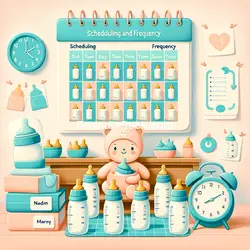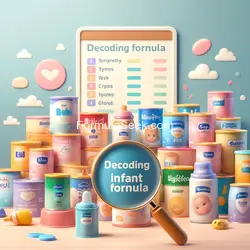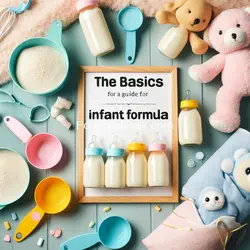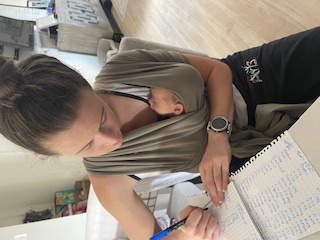Navigating Baby Feeding Challenges: A Parent's Guide to Common Concerns
Published: 4/15/2024 6:00:00 PM by Bryan
Seeing your baby spit up can be worrying, but it's pretty common. Babies have immature digestive systems, and sometimes, food comes back up. Here's what can help:
- Keep Feedings Calm: Try to feed in a quiet, relaxed setting.
- Take Your Time: Don't rush feedings. Allow your baby to take breaks.
- Burp Your Baby: Frequent burping helps eliminate air swallowed during feeding.
- Elevate After Eating: Keep your baby upright for 20-30 minutes after feeding.
Talk to your pediatrician if your baby seems uncomfortable or is not gaining weight. They can check for something more serious, like GERD (gastroesophageal reflux disease).
Read more by clicking here
Smooth Moves: Transitioning Your Baby from Formula to Solid Foods
Published: 4/14/2024 6:00:00 PM by Bryan
Around six months old, your baby might start showing signs that they're curious about what you're eating and ready to try some solid foods. Here are a few clues to look out for:
- They can sit up with little or no support.
- They have good head and neck control.
- They show interest in your food, maybe even reaching for it!
- They open their mouth when food comes their way.
- They can move food from a spoon into their throat.
Read more by clicking here
Keeping It Clean: The Ultimate Guide to Bottle Feeding Hygiene
Published: 4/13/2024 6:00:00 PM by Bryan
First off, babies' immune systems are still developing, making them more vulnerable to germs than older kids and adults. Proper cleaning and sterilizing of feeding bottles and accessories help protect your baby from unwanted bugs that can cause infections.
Read more by clicking here
Navigating the World of Bottle Feeding: Scheduling and Frequency
Published: 4/12/2024 6:00:00 PM by Bryan
Babies are unique, and their feeding needs can vary. Babies must eat more frequently than older kids and adults, who eat three meals daily. Here's a general guide to help you understand how often your baby might need feeding based on age.
Read more by clicking here
Understanding Baby's Hunger: A Guide to Feeding Cues
Published: 4/11/2024 6:00:00 PM by Bryan
Your baby knows when they're hungry and has ways to show it. Catching these early cues means you can start feeding before the crying stage for a more peaceful mealtime. Here's what to look for...
Read more by clicking here
Mastering Bottle Feeding: Techniques and Positions for Happy Babies
Published: 4/10/2024 6:00:00 PM by Bryan
Just like adults, babies have their preferences when it comes to eating. Finding a comfortable position is vital to a smooth feeding session. Here are some popular options...
Read more by clicking here
How to Safely Prepare Infant Formula: A Step-by-Step Guide
Published: 4/9/2024 6:00:00 PM by Bryan
First things first, always wash your hands thoroughly with soap and water before preparing the formula. It's the best way to keep germs away from your baby's food.
Read more by clicking here
Getting Ready for Bottle Feeding: A Simple Guide for Parents
Published: 4/8/2024 6:00:00 PM by Bryan
Picking the perfect bottle and nipple isn't just about what looks cute (though some pretty adorable options exist!). It's about what works best for your baby. Here's how to choose...
Read more by clicking here
Decoding Infant Formula: Types, Brands, and How to Choose
Published: 4/7/2024 6:00:00 PM by Bryan
When you stroll down the baby food aisle, you'll see a bunch of different infant formulas. Each type has unique benefits and is designed for babies with various needs. Here's the scoop...
Read more by clicking here
The Basics of Infant Formula: A Guide for New Parents
Published: 4/6/2024 6:00:00 PM by Bryan
Hello, new parents! Today, we're diving into infant formula, a key topic for many families. Whether you're exploring formula options before your baby arrives or considering a switch, this guide is for you. Let's break down the essentials of infant formula to ensure your little one gets the best start.
Read more by clicking here













